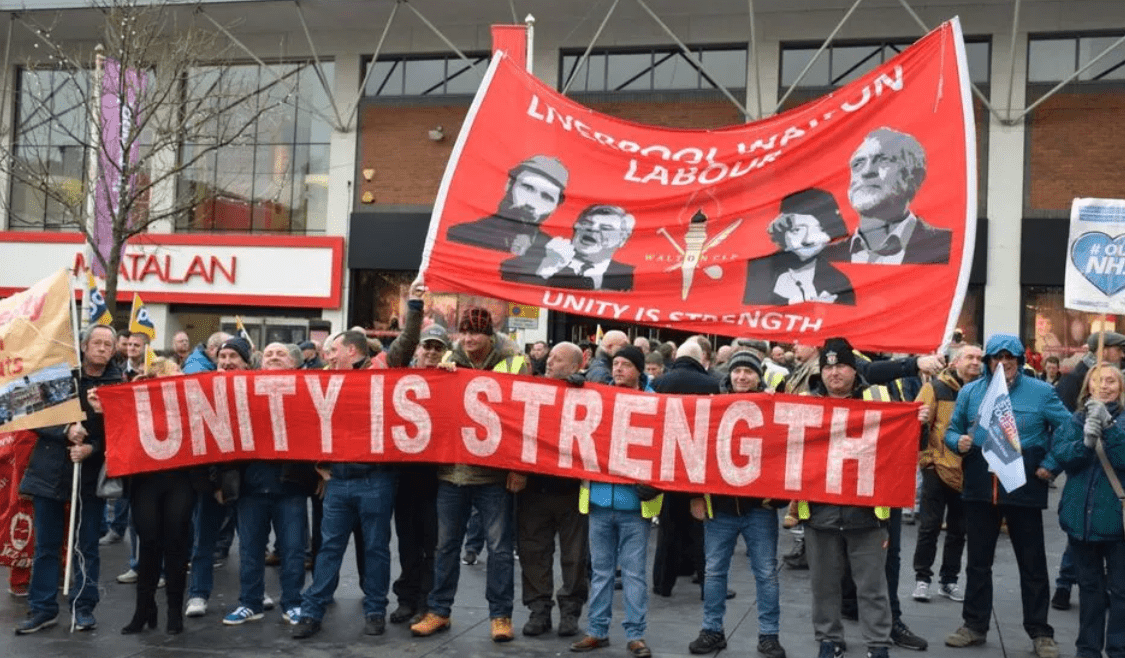Following a special report into Liverpool city council, the Tory Government is taking control of some council functions, because of what has been described as a “pervasive and rotten culture” in the local authority. Yet we will wait a long time before commissioners are sent into Whitehall, despite the Tory government being surrounded by a stinking miasma of corruption on a far grander scale.
It is ironic that the decision on Liverpool was taken by the Communities Secretary, Robert Jenrick, because he has been personally responsible for and has even been reprimanded for ‘inappropriate’ behaviour. This is the man whose social connection with a developer allowed him to approved a £1bn property development, just prior to the introduction of a government levy that would have cost that same developer £40m. The developer in question was a Tory donor and the few thousand pounds donated he must have considered as money well-spent.
“Serious breakdown in governance”
According to Jenrick, speaking in the House of Commons, the special enquiry led by Max Caller into Liverpool contained a “deeply concerning picture of mismanagement, a breakdown of scrutiny and accountability…putting spending of public funds at risk and undermining the city’s economic development.” There had been, he said, a “serious breakdown in governance,” and a flouting of normal rules. He could well have been talking about the Tory government in Westminster.
In Liverpool, the Caller Report found, the City had awarded “dubious contracts”, suggesting that the “best interests” of Liverpool residents were not being served. Yet the sums involved in Liverpool’s deals are still chicken-feed in comparison to the “dubious contracts” liberally thrown around by Boris Johnson and Matt Hancock, usually to friends and associates of the Tory Party, under the pretext of fighting Covid.

Nothing in modern history compares to the £37bn awarded to the ‘test and trace’ programme – which a parliamentary report concluded had made “little measurable difference” to the pandemic in the UK. What it has made a considerable difference to, is the balance sheet of Serco, the main company involved, which recently gave out a bumper dividend to its shareholders. So we have a situation where the perpetrators of massive corruption at the top are fixing their sights on allegations of corruption, on a much smaller scale, in one city, Liverpool.
Labour members in Liverpool will be dismayed
Of course, no honest activist in the labour movement will condone corruption of any sort, and least of all in a ‘Labour’ council. It is appalling, and something that needs to unreservedly condemned, if so-called ‘Labour’ councillors do not declare gifts (or even receive gifts), or if they are involved in behind-the-scene deals away from public scrutiny. It is equally appalling if ‘Labour’ councillors are guilty of bullying or intimidating council staff, as the Caller Report suggests.
Notwithstanding the jaw-dropping hypocrisy of Jenrick and the Tories, the accusations against Liverpool may have a major effect, at least temporarily within the city. The introduction of commissioners, to run the highways, property management and regeneration departments of the council, will have cast a pall of gloom over the city and particularly over its Labour Party members, the overwhelming majority of whom are honest, working-class people. They will be dismayed beyond measure to see the reports filling the newspapers and TV screens, associating their party, albeit incidentally, with allegations of graft, corruption and intimidation.
After the Labour hierarchy’s trampling over the rights of Party members in the selection of the mayoral candidates, this report comes as another body blow. Despite this, many Labour rank-and-file members are prepared to campaign for its candidates particularly those on the left. In Walton, for example, where several left-wing candidates are standing, leafletting has still been taking place each day over past week. However, overall, there will not be much enthusiasm for election work as there might have been, except perhaps where candidates are clearly standing on the left of the party.
Too many councils run by small cabals of councillors
Robert Jenrick has suggested that the commissioners will be in the City to “assist” and “support” the elected councillors. That remains to be seen. Perhaps, as one comment on the Financial Times website put it, “Liverpool citizens will be shown how mismanagement really works.”
This is not the place for a full-blown analysis of council structures and management, but there are certainly some lessons in the Liverpool situation that need to be taken on board. In the past, Labour councils had groups of councillors that functioned in a more democratic manner, in the sense that committees were elected from the body of councillors and were responsible to them. Decision-making was broader, more open, and more democratic.

In many modern councils, after changes much-favoured by the right of the Labour Party, it is small groups of leading councillors – and sometimes the mayor alone – who makes decisions, hidden from any scrutiny by other councillors, much less by the wider labour movement.
Too many ‘Labour’ councillors are Freemasons
Like the parliamentary party and the Labour Party’s official apparatus, the municipal ‘wing’ of the Labour Party has long been a bastion of the right wing and it remained so even during the Corbyn years. There are still far too many supposed ‘Labour’ councillors whose only concern is their own personal prestige and their council expenses, rather than the greater good of the working-class community they serve. There are still far too many secret deals and far too many ‘Labour’ councillors in the same Freemasons Lodge as their Conservative opponents.
Just to take on example, the ludicrous decision to open a deep coal-mine in Cumbria was taken on behalf of the council, but it was a decision that had minimal consultation on the Labour council group, and none whatsoever among the county’s 6,000 Labour members. Whether bad decisions in Liverpool were made from incompetence or corruption remains to be seen, but they would be far less likely where all of the Labour councillors were involved in policymaking and where the councillors themselves were subject to the scrutiny of the broader labour movement.
Labour has a proud tradition in Liverpool
The Labour Party has a proud tradition on Merseyside. Out of the current 90 Liverpool councillors, 72 are Labour. The region sends 14 Labour MPs to Westminster. Liverpool last returned a Tory MP 38 years ago and the last Tory councillor in the city was elected 24 years ago. It is still a strongly anti-Tory city, but as a result of the smear of corruption and the bureaucratic manoeuvres of the right wing over the mayoralty, Labour may lose seats to the Liberal Democrats or a Green Party candidate, particularly in the more affluent areas of the city.
The Labour Party membership will feel themselves hugely let down, by the leading councillors in the City, by the regional officers of the Labour party, and not least by the parliamentary leadership of Keir Starmer. Sometimes it looks as if every time Boris Johnson shouts “jump!” Keir Starmer just asks “how high?” His ‘opposition to the Tories is so weak that it is clearly showing in his personal poll ratings.
To the dismay of Labour Party members, Keir Starmer and Steve Reed, Shadow Communities Secretary, have accepted the report and its recommendation, without any qualification or conditions at all. Steven Reed suggested that report raised “grave and serious concerns about decision-making” in the city.
It has been suggested that the Labour Party might have its own internal inquiry, and Jacqui Smith’s name has been suggested. She was Home Secretary under the Blair government and she was forced to resign in June 2009 after a scandal involving her parliamentary expenses, so she is hardly the best person to lead such an inquiry.
The Labour should hold an inquiry, but with an inquiry team made up of elected Liverpool councillors, not associated with the former mayor or cabinet offices, as well as rank and file Labour members and trade unionists. An inquiry, in other words, should be a means of ensuring open accountability and scrutiny.
It would have been a bit more appropriate if Steven Reed had at least drawn attention to Jenrick’s own corruption and hypocrisy. Jenrick is in the pocket of the land developers and he is in the cosy position of forcing councils to sell land to his friends. Steven Reed could have mentioned this, but didn’t. He could have said that anything Joe Anderson may have mis-spent would be peanuts compared to what the Tories are throwing away in government.
Tories have taken £400m from Liverpool since 2010
Steve Reed or Keir Starmer could also have mentioned, for example, that Liverpool has lost eye-watering sums of money since the Tories took over in 2010. According to the Liverpool Echo (November 12th), the accounts for the City make for “grim reading”. The cuts in national government funding have meant that there are now 3,000 fewer council employees than there were before, meaning that the services they used to provide have now disappeared. “Liverpool has already borne the brunt of a decade of austerity measures”, it says, “which has seen the city council lose an unprecedented £420 million in government funding.”

Caller’s report even did something Keir Starmer didn’t do – it mentioned the fact that Liverpool is the fourth most deprived local authority area in England. “It has a comparatively youthful population with 42.5% of the population under the age of 30 compared to an English average of 37.7% but life expectancy is 6 years lower than the England average and health outcomes are poor with a recent report concluding 86% of people are not active enough to maintain a good health”.
“Liverpool’s rate of unemployment is higher than the national average and 16% of its residents have no qualifications (16-64) which is double the national average. The decline of Liverpool’s dockland and industry is well documented and has left numerous vacant sites across the city. This combined with an aging housing stock has meant that development and regeneration initiatives are welcomed in the city”.
Tory’ vandalism far worse than anything Anderson might have done
Kier Starmer could have pointed out some of these things but he chose not to. He chose not to mention the incontestable fact that the Tories have been responsible for municipal vandalism in Liverpool on a far bigger scale that anything that Joe Anderson or other councillors might have been doing.
In the thirty-five years since the Liverpool city council fought against the Thatcher government, against its cuts and impositions, and for the right to build houses and provide services, there has been a torrent of lies and distortions peddled about that period. Even now, the infamous Kinnock speech at Labour conference is trotted out, as if there were the remotest comparison between Liverpool council then and now.
In the 1980s, Liverpool’s Labour councillors were debarred from office and surcharged, not for corruption, but for standing up for policies in the interests of working people. The decisions and policies of the council then were always subject to the decisions of the District Labour Party and that should be the model for the Liverpool council – assuming we still have a Labour council – going forward.
Once they have got over the initial shock, the workers of Liverpool will be on their guard against the commissioners going beyond their brief to “guide and support” the elected councillors, in the three years in which they may be in place. The labour movement must demand that openness, transparency and accountability are maximised, that policy decisions are open to the full scrutiny of the full council and that the policies of the council itself are subject to the scrutiny and are accountable to the city Labour Party.
No cuts in services and no cuts in pay and conditions
The commissioners – who are directly answerable only to Westminster – need to be watched and monitored. They should not be a screen for imposing any policies against the interests of the people of Liverpool or its workforce. The trade union movement needs to be vigilant, and Labour should follow a policy of ‘no cuts in services’ for the people of the city and ‘no cuts in the wages and conditions’ for Liverpool council workers.
According to the Liverpool Echo, “even before the pandemic arrived, the council was going to have to find another £29m savings”. The council’s emergency reserves are apparently down to “a vanishingly small £17m”. The labour movement needs to be clear – the commissioners should not become a Trojan horse to introduce cuts in services, jobs or conditions of employment. Inquiry report or not, it is the responsibility of the labour movement collectively to defend the living standards of working-class people, in Liverpool as elsewhere.
The new arrangements for Liverpool city council amount to an ‘armed truce’ between the labour movement of the city and the Tory government. How long it remains a ‘truce’ we shall see. In the meantime, it is important that the trade union and Labour movement discusses the crisis and what it signifies. Strategies need to be developed for the future that include the likelihood – because that is what it is – of an end to the truce and a new fight to defend the people of the City.



